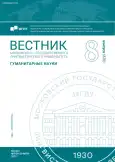Perception of Folk Song Melody as a Result of Mental Code Operation
- Authors: Petročenko E.V.1
-
Affiliations:
- Voronezh State University
- Issue: No 8(876) (2023)
- Pages: 93-101
- Section: Linguistics
- URL: https://bakhtiniada.ru/2542-2197/article/view/350076
- ID: 350076
Cite item
Abstract
Deep interrelation between folk music and language is determined by cognitive mechanisms, which are identified indirectly by means of psycholinguistic methods. The study is based on ancient folk songs. The data obtained by perception analysis suggest that Russian musicians should have common mental codes to identify some native, nationally-specific features in the tone movement, as well as to perceive and identify the emotive meanings of native vocal speech.
Keywords
About the authors
Elena Viktorovna Petročenko
Voronezh State University
Author for correspondence.
Email: petrocenko@mail.ru
PhD (Philology), Associate Professor, Associate Professor at the German Philology Department, Faculty of Romance and Germanic Philology
Russian FederationReferences
- Kubryakova, E. S. (2004). Yazyk i znaniye = Language and knowledge. Moscow: Yazyki slavyanskoj kulˈtury. (In Russ.)
- Demyankov, V. Z. (2005). Kogniciya i ponimaniye teksta = Cognition and text recognition. Issues of cognitive linguistics, 3, 5–10. (In Russ.)
- Altenmüller, E. (2006). Musikwahrnehmung und Amusien. Neuropsychologie (S. 425–434). Berlin, Heidelberg: Springer.
- Korsakova-Kreyn, M. N. (2010). Tonalˈnoe prostranstvo i melodicheskoye myshleniye = Pitch range and “melodic” thinking. Filosofskiye issledovaniya, 3, 108–124. (In Russ.)
- Tyulin, Yu. N. (1966). Uchenije o garmonii = The theory of musical harmony. Moscow: Muzyka. (In Russ.)
- Brjusova, N. Ya. (1948). Russkya narodnaya pesnya v russkoj klassike i sovetskoj muzyke = Russian folk songs in Russian classics and Soviet music. Moscow–Leningrad: Muzgiz. (In Russ.)
- Sposobin, I. V. (1969). Lekcii po kursu garmonii = Lectures on the course of musical harmony. Moscow: Muzika. (In Russ.)
- Veličkova, L. V., Petročenko, E. V. (2021). “Vocal form” as a music-phonetic speech genre: aspects of study. Science journal of Volgograd state university. Linguistics, 20(2), 133–143. (In Russ.)
- Yuferova, O. A. (2016). The phenomenon of code in musical communication. Bulletin of Kemerovo State University of Culture and Arts, 37(2), 113–121. (In Russ.)
- Potebnya, A. A. (1958). Iz zapisok po russkoj grammatike = Some notes on Russian grammar (vols. 1–2). Moscow: Uchpedgiz. (In Russ.)
- Zvetkova, O. I. (2007). Urovni vospriyatiya muzikalˈnogo teksta = The levels of vocal text perception. Summa filosofii, 7, 269–276. Ekaterinburg: Isdatel'stvo Uralˈskogo universiteta. (In Russ.)
- Garipova, N. M. (2017). O mehanizmah kognitivnyh processov psihiki pri vospriyatii muzyki = Cognitive psychic processes in music perception. Kognitivnye issledovaniya na sovremennom etape, KISE-2017 (pp. 223–331): Proceedings of All-Russia Conference. Kazanˈ: Isdatel'stvo PFU. (In Russ.)
- Hotinec, V. Yu. (2000). Etnicheskoe samosoznanie = Ethnic conscience. St. Petersburg: Aletejja. (In Russ.)
- Vinarskaya, E. N. (1989). Vyrazitelˈnyye sredstva teksta (na materiale russkoj poezii) = The study of textual means of expression (based on Russian poetry). Moscow: Vysshaya shkola. (In Russ.)
- Vinarskaya, E. N. (2001). K probleme bazovyh emocionalˈnyh konceptov = The problem of basic emotive concepts. Vestnik VGU. Lingvistika i mezhkulˈturnaya kommunikaciya, 2, 12–16. (In Russ.)
- Müller, H., Кrummenacher, J. (2006). Funktionen und Modelle der selektiven Aufmerksamkeit. In Neuropsychologie (S. 239–253). Berlin, Heidelberg: Springer.
- Zhirov, M. S., Alekseeva, O. I. (2009). Cultural morphology of the Russian folk song: theoretical and methodological aspect. Belgorod state university scientific bulletin. Philosophy, sociology, law, 9, 34–43. (In Russ.)
- Potapova, R. K., Potapov, V. V. (2018). Sinkreticheskij dualism muzyki i rechi kak osobyj semioticheskij fenomen bytiya cheloveka = Syncretic dualism of speech and music as a special semiotic phenomenon of human existence. Chelovek: Obraz i sushchnost’. Gumanitarn•yye aspekty, 3(34), 52–71. INION RAN. (In Russ.)
Supplementary files










